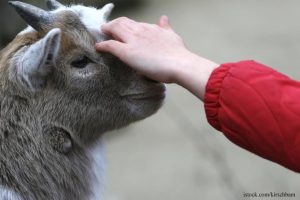The father of Colton Guay, the 20-month-old boy who died from an E. coli infection he contracted at the Oxford County Fair, told WMTW that hand sanitizer dispensers at the fair were empty. The family used their own hand sanitizers, “but look what happened,” he told the station.
Little Colton was one of two young boys who got E. coli infections after attending the fair. Both of them developed hemolytic uremic syndrome (HUS), a complication of E. coli infections that causes kidney failure, seizure, stroke, coma and death. Myles Herschaft, 17 months, remains hospitalized at the Maine Medical Center.
State health officials said both boys were sickened by the same strain of E. coli O111 – meaning their infections came from the same source. It is not yet known if that source was the petting zoo, food, or some other source at the fair. Results of tests on samples taken from the fair are expected next week.
This is not the first time that a visit to the fair has taken a tragic turn. E. coli outbreaks linked to fairs or petting zoos are reported each summer. Recent examples abound. Five children were sickened in an E. coli outbreak in North Dakota this summer after attending the Red River Valley Fair. In May, an E. coli outbreak at the Milk Makers Fest at the Northwest Fairgrounds in Whatcom County, Washington sickened at least 36 children. And a 2014 E. coli O157:H7 outbreak linked to Zerebko Zoo Tran, a traveling petting zoo sickened at least 13 people.
A 2004 E.coli outbreak at the North Carolina State Fair was the largest in recent history. A total of 108 case patients were identified, 15 of whom developed HUS.
 After the outbreak, the National Association of State Public Health Veterinarians (NASPHV) published new recommendations for operators that are still viewed as important safety standards. They are also endorsed by the U.S. Centers for Disease Control and Prevention (CDC). Here is what they recommend:
After the outbreak, the National Association of State Public Health Veterinarians (NASPHV) published new recommendations for operators that are still viewed as important safety standards. They are also endorsed by the U.S. Centers for Disease Control and Prevention (CDC). Here is what they recommend:
Young children should be restricted from directly entering open-interaction areas of petting zoos. No food or beverages should be allowed in animal areas, nor should toys, pacifiers, spill-proof cups (“sippy cups”) or baby bottles. Cigarette smoking should also be prohibited. Manure and soiled animal bedding should promptly be removed. Animal waste and the tools used to remove it should be confined to designated areas restricted from public access. Children should be closely supervised during contact with animals to discourage contact with manure and soiled bedding.
Appropriate hand washing should be required. Trained staff should be present in areas where animal contact is permitted to encourage appropriate human-animal interactions, reduce risk for exposure. If feeding animals is permitted, only food sold by the venue for that purpose should be allowed. Transition areas between animal and non animal areas should have information about prevention of infection and injury and location of hand-washing facilities and instructions for visitors to wash their hands upon exiting. Signage instructing visitors not to eat, drink, or place their hands in their mouth while in the animal area. Exits of transition areas should be marked with signs instructing the public to wash their hands. Hand-washing stations should be available and accessible to all visitors, including children and persons with disabilities.
“It is the responsibility of petting zoo owners to make sure the animals are kept clean and that there are hand washing stations for the children,” said Fred Pritzker, who has represented families whose children have died from E. coli infections they contracted from a fair. “These tragic losses are preventable.”




